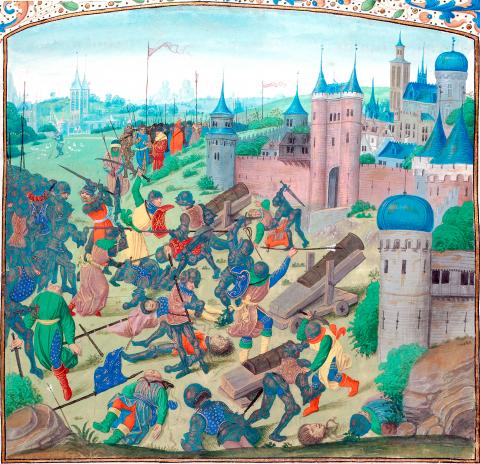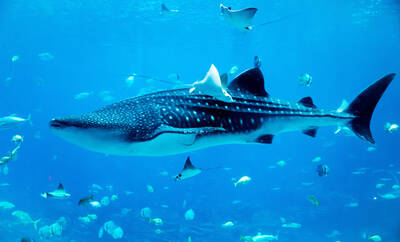Chinese practice
因噎廢食
to banish food for fear of choking

Photo: Wikimedia Commons
照片:維基共享資源
(yin1 ye1 fei4 shi2)
中國東周的戰國時期(西元前四七五~前二二一年),各國諸侯對周王朝不再忠誠,且相互爭奪權力。秦國在西元前二二一年擊敗各國後,周朝也隨之結束。
出生於戰國初期的思想家墨翟(約西元四七○~約三九一年),其思想是諸子百家中的顯學。墨翟強烈反對暴力,提出「非攻」(不要去攻打別人)之說,並提倡「兼愛」,而不像儒家一樣只把忠誠建立於家庭、宗族、統治者和國家的倫理。咸認《墨子》是墨翟及其弟子的一系列談話,在〈非攻上〉一章中,有這麼一句話:「殺一人謂之不義,必有一死罪矣,若以此說往,殺十人十重不義,必有十死罪矣」(殺掉一個人,叫做不義,必定有一項死罪。假如按照這種說法類推,殺掉十個人,有十倍不義,則必然有十重死罪了)。該章又說:「今小為非,則知而非之。大為非攻國,則不知非,從而譽之,謂之義」(現在小範圍內做不對的事,人們就都知道指責其錯誤;大範圍內做,卻不知道指責其錯誤,反而跟著稱讚說這是義舉)。
秦王的丞相呂不韋所監修的《呂氏春秋》,是含括諸子百家思想的百科全書,成書於西元前二三九年──不到二十年後,秦王將成為中國第一位皇帝。《呂氏春秋.孟秋紀.蕩兵》一章,對墨翟「非攻」之說提出反駁,認為養兵是必要之惡,對攻擊敵國至關重要,就像父母須懲罰孩子、使其守規矩,也如同國家須制定法律以避免陷入無政府狀態一樣。該章承認戰爭的確可厭,但說若把這當做廢除軍隊的理由,則很荒謬:「夫有以饐死者,欲禁天下之食,悖;有以乘舟死者,欲禁天下之船,悖;有以用兵喪其國者,欲偃天下之兵,悖」(假使因有人在吃飯時噎死,就禁止天下人飲食,這是荒謬的;因為有人乘船淹死,就禁止天下人乘船,這是荒謬的;有人因為曾有君王用兵而亡國,就想把天下的軍隊都廢除,同樣也是荒謬的)。成語「因噎廢食」,便是由此而來,其字面意思是「因為害怕窒息而放棄食物」,意指不成比例的反應──因害怕犯小錯而不去做該做的、更重要的事。
與「因噎廢食」意義相似的英文說法,有些線上詞典認為是「to cut off your nose to spite your face」(跟自己過意不去。字面意為切掉自己的鼻子,和自己的臉作對)。雖然這句話也表示損人不利己的過度反應,但它並不是跟成語「因噎廢食」完全對應的翻譯。這句話的歷史也並不長,它首次見諸出版品是在十八世紀晚期。英語詞典編纂者法蘭西斯‧葛羅斯的一七九六年出版的俚語詞典《Classical Dictionary of the Vulgar Tongue》,收錄了這句話早期的變體──「He cut off his nose to be revenged of his face」(他切掉鼻子以報復他自己的臉),詞典定義這句話是「Said of one who, to be revenged on his neighbour, has materially injured himself」(表示某人為了向鄰居報仇,而傷害了自己的身體)。
(台北時報林俐凱譯)
如果因為少數既得利益者的反對而停止改革,那就是因噎廢食。
(It makes no sense to prevent the reforms from happening simply because of the objections of a minority of people with vested interests.)
英文練習
cut off your nose to spite your face
In the Warring States Period (475-221BC) of China’s Eastern Zhou Dynasty, the feudal lords of individual states loosened their allegiance to the Zhou court and vied with each other for power. The dynasty ended when, in 221BC, the state of Qin defeated the others.
The philosopher Mo Di (c.470- c.391), born at the beginning of the Warring States, fronted one of the “100 Schools of Thought.” Mo Di was strongly opposed to violence, espousing the doctrine of feigong zhi shuo, or “condemnation of offensive war,” and advocated “universal love” over Confucian teachings more based on allegiance to family, clan, ruler and state. In the feigongshang (Condemnation of Offensive War I) chapter of the Mozi, a collection of sayings ascribed to Mo Di and his followers, there is the line 殺一人謂之不義,必有一死罪矣,若以此說往,殺十人十重不義,必有十死罪矣 (The murder of one person is called unrighteous and incurs one death penalty. By the same logic, the murder of 10 people would be 10 times as unrighteous, and there should be 10 death penalties). Elsewhere in the chapter, we find 今小為非,則知而非之。大為非攻國,則不知非,從而譽之,謂之義 (Now, when a little wrong is committed people know they should condemn it, but when such a great wrong as attacking a state is committed people do not know that they should condemn it. On the contrary, it is applauded and called righteous).
Lu Buwei, the chancellor of the king of Qin, oversaw the creation of the lushi chunqiu (Spring and Autumn Annals of Master Lu), an encyclopedic compendium of the ideas of the 100 schools published in 239BC, less than 20 years before the king would become the first emperor of China. The dangbing chapter of the annals was a refutation of Mo Di’s feigong zhi shuo, arguing that, just as parents need to punish their children to keep them from becoming unruly, and just as states needed to have laws in place to avoid a descent into anarchy, maintaining an army was a necessary evil, essential for attacking hostile states. The chapter conceded that warfare was objectionable, but said that to use this as a reason for abolishing armies altogether was ridiculous. We read, 夫有以饐死者,欲禁天下之食,悖;有以乘舟死者,欲禁天下之船,悖;有以用兵喪其國者,欲偃天下之兵,悖 (For there to be one who choked to death, and so desire to abolish food from the world, would be absurd; for there to be one who traveled by boat and drowned, and so desire to ban all boats in the world, this would be absurd; and for a state to fall because soldiers were mobilized, and to rid the world of all armies, this would be equally absurd). From this we get the idiom 因噎廢食, literally “to banish food for fear of choking,” to mean to react to a situation in a disproportionate manner.
An English alternative of 因噎廢食 given in several online dictionaries is “to cut off your nose to spite your face.” While this also denotes a disproportionate reaction to circumstances that in fact results in you disadvantaging not just your opponent but yourself, it is not completely interchangeable with the Chinese idiom. Neither is it very old, having first appeared in print in the late 18th century. In the English lexicographer Francis Grose’s 1796 edition of the Classical Dictionary of the Vulgar Tongue, we find an early variant, “He cut off his nose to be revenged of his face,” with the definition “Said of one who, to be revenged on his neighbour, has materially injured himself.”(Paul Cooper, Taipei Times)
You should accept the freelance work, even if you don’t like the project manager. If you turn them down, you’ll be cutting off your nose to spite your face.
(雖然你不喜歡那個專案經理,你還是應該要接那個案子。如果你婉拒的話,就是因噎廢食。)

The third-hottest July worldwide ended a string of record-breaking temperatures last month, but many regions were still devastated by extreme weather amplified by global warming, the European climate monitoring service said Thursday last week. Heavy rains flooded Pakistan and northern China; Canada, Scotland and Greece struggled to tame wildfires intensified by persistent drought; and many nations in Asia and Scandinavia recorded new average highs for the month. “Two years after the hottest July on record, the recent streak of global temperature records is over,” Carlo Buontempo, director of the EU’s Copernicus Climate Change Service, said in a statement. “But that

Whale sharks are the largest species of fish in the world. They aren’t related to whales, but take their name due to their enormous size. At full maturity, whale sharks measure around nine or 10 meters long and can weigh from 15,000 to 40,000 kilograms. Whale sharks live in warm waters, with about 75% of them found in the Indo-Pacific region. They can migrate thousands of kilometers to different feeding grounds, but at a slow speed of 5 km/h on average. Whale sharks have a broad, flat head and are typically brown or gray in color. Their distinguishing characteristic

Continued from yesterday(延續自昨日) https://www.taipeitimes.com/News/lang Whale shark reproduction has long been a mystery for scientists. However, a significant discovery in 1995 off the eastern coast of Taiwan provided valuable insights. Researchers examined a pregnant female of the species and found over 300 embryos inside her body, ranging from about 40 to 60 cm in length. This discovery revealed that whale sharks are ovoviviparous. Instead of laying eggs in the ocean, the mother carries them internally until they hatch, giving birth to fully developed live young. Since the eggs don’t hatch all at once, embryos at different stages of development can all exist within

Peacocks are among the most beautiful birds in the world. Their bright feathers and graceful movements have fascinated humans for centuries. These magnificent creatures belong to the pheasant family and are found in regions across Asia and Africa. Let’s explore peacocks’ unique characteristics and cultural significance. There are three main species of peacock: the well-known Indian peafowl, native to South Asia; the endangered green peafowl from Southeast Asia; and the rare Congo peafowl, found in African rainforests. Although the term “peacock” technically refers only to males, many people use it for both sexes. Male peacocks display their colorful tail feathers, which